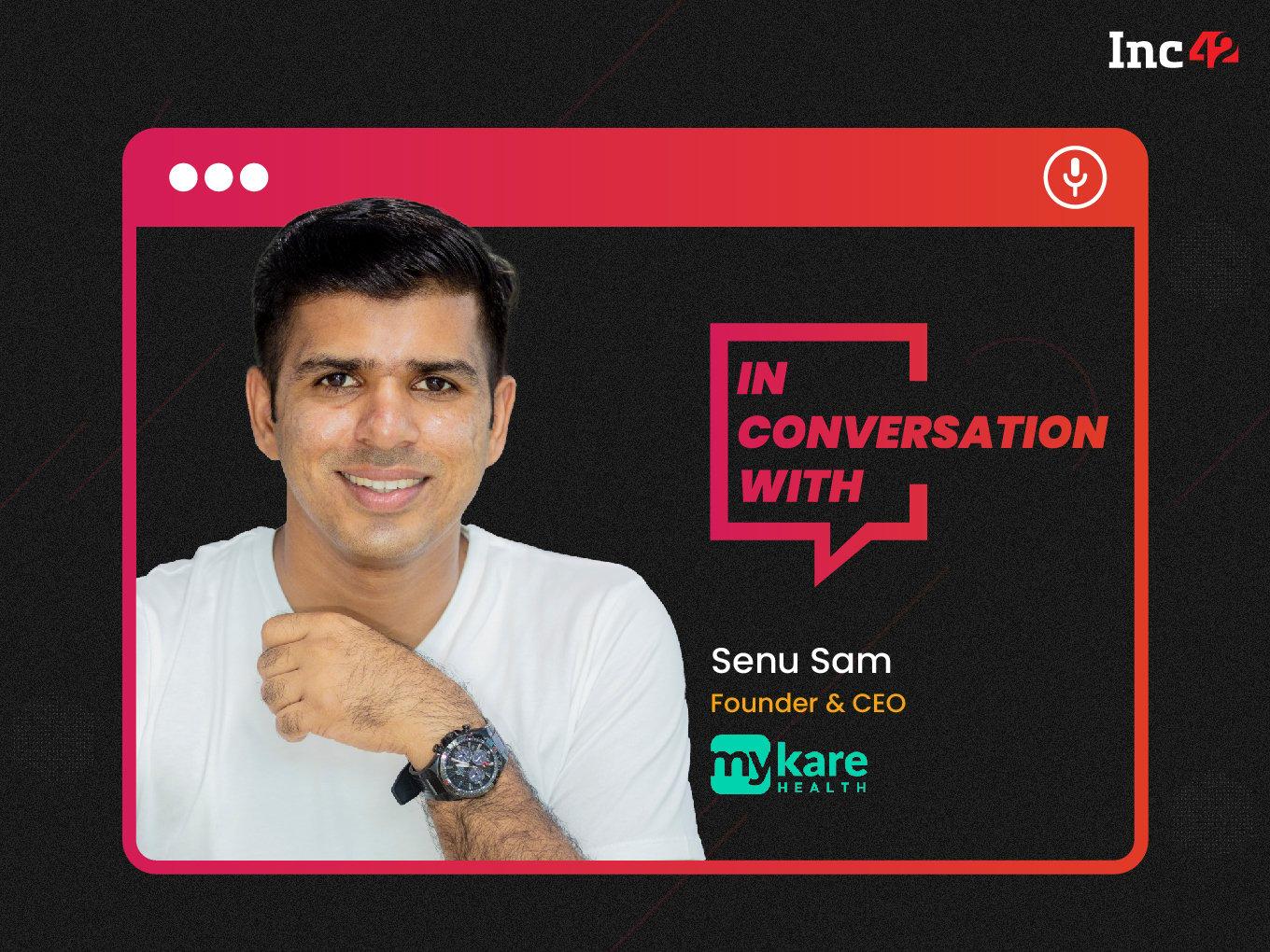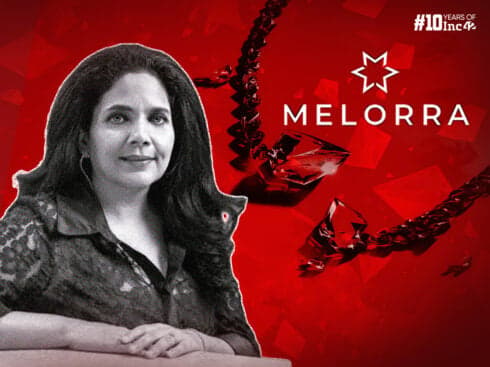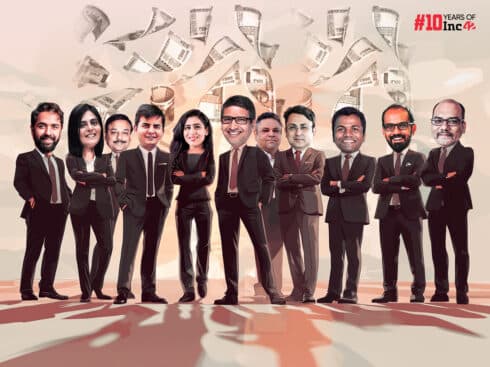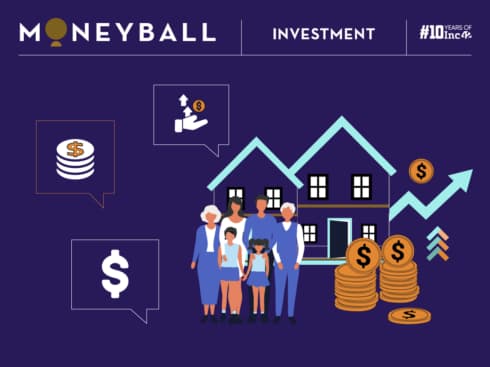In an interaction with Inc42, Mykare Health’s Senu Sam discusses some of the challenges faced by the healthtech sector in extending its reach to India's Tier II and III regions
As a first-generation entrepreneur, he initially struggled to launch his healthtech startup but eventually found a solution that would not fail
Catering to consumers from Tier II and III regions is never easy, but Sam has identified how startups can navigate the roadblocks
In the realm of Indian healthcare, a significant number of patients fall within the middle income bracket. Yet, accessing transparent, affordable healthcare remains a distant dream for them, especially when it comes to surgeries. Alternatively, a large portion of advanced healthcare facilities is concentrated in Tier 1 regions, leaving those beyond the metros underserved.
Nevertheless, there is a silver lining as the country’s more than 3,548 active healthtech startups are trying to fix this anomaly. Armed with cutting-edge technology, apps and accessories, they work on providing access to quality healthcare to people from Tier II and III locations and beyond.
One of the latest entrants in this space is Mykare Health, a Kerala-based healthtech startup connecting patients looking for affordable healthcare regions with small and mid-sized hospitals for affordable elective surgeries.
For context, these procedures are planned well in advance (hence, they don’t cover medical emergencies, but they may not be optional, either).
Mykare Health, has already raised $2.1 Mn in funding from a clutch of investors, currently operates in Chennai, Bengaluru, Coimbatore, Madurai, Hyderabad, Visakhapatnam, Mysore, Pune, Kochi and Thiruvananthapuram and has an aggressive growth plan in place to emerge profitable within two years, said founder and CEO Senu Sam.
What sets it apart from its ilk, is its thorough understanding of the healthcare hurdles that the middle class encounters across Tier II and III regions.
In fact, Sam comes from a Tier III village and knows firsthand the hopes and hardships of the people at the grassroots. His journey from humble beginnings to creating Mykare Health has helped shape the startup’s vision and goals.
In an interaction with Sam, we delved into Mykare Health’s impact on the healthcare landscape, the intricate challenges the CEO navigated to launch the startup and his leadership style that propels it forward. Here are the edited excerpts.
Inc42: You took a leap of faith from corporate leadership to the startup space and set up your healthtech business. What drove you to do this?
Senu Sam: It was a big leap, but I was driven by huge challenges. I worked my way up from a Tier III village (that’s the term he used throughout the interview to underline its remoteness) to become a vice-president at an Indian hospital. Yet, when my father had to be taken for a surgery in a small-medium hospital in Kerala due to travel restrictions imposed due to Covid, I became aware of the hurdles patients faced in non-metro cities.
The hospital had inadequate facilities, untrained staff, communication gaps and an unresponsive approach to treatment. The most challenging part was the absence of surgeon counselling, forcing my family to make critical decisions without expert guidance. Also, my father received vague recovery instructions post-surgery, hindering his healing process.
Worse still, most hospitals lacked a comprehensive insurance process and the final bill rarely matched initial estimates.
All these exposed the widespread healthcare issues in small and medium hospitals in India. I felt I had to address them and eventually I left my corporate role and moved to Kerala to launch Mykare Health in 2022. Our mission is to improve transparency and efficiency in healthcare delivery for the middle class in India.
Inc42: As an entrepreneur-founder from a non-metro, what barriers did you face and how did you tackle them?
Senu Sam: Entrepreneur is a fancy term in villages and the ecosystem is limited. People there focus on education and stable jobs to deal with financial hurdles. It does not mean they don’t have ambitions. However, most entrepreneurs fail due to a lack of awareness and financial resources.
It also took me 12 years to understand these challenges. I started my journey by saving my earnings and financial freedom came only after those years. While doing my post-graduation in Education, I realised that Apollo Hospitals would be one of the best workplaces. So, I joined and worked my way up to an executive role. But they were all deliberate steps to realise my vision. I kept moving forward, dealing with one challenge at a time.
I liked my cushy corporate job but decided to leave my comfort zone and teamed up with a doctor in Hyderabad to run a fertility centre. So, Mykare Health is not my first venture. Eventually, I started it after looking at the ground-level issues in healthcare. I also know there will be numerous challenges to conquer in the next five to 10 years before fully achieving my goals. However, I also believe that entrepreneurship is an ongoing journey which could take an entrepreneur 50 years to overcome ongoing challenges.
Inc42: Can you tell us how your background and experiences shaped your decision-making and leadership style?
Senu Sam: My past experiences have deeply influenced how I work. I had struggled financially and often pawned or sold the little gold my family had to fund my education. And I vividly remember the hardships I faced while securing a job at Apollo in Delhi. When I travelled to Delhi for an interview, I just had INR 5,000 with me and no place to stay. Plus, I had to learn English to break the language barrier. Those were hard times, but I found purpose in my struggle, leading me to the point where I could start my venture.
I never forgot what I learnt in those days. So, I have fostered a culture of freedom and responsibility at Mykare Health and always respect what my team members are thinking. Colleagues who embrace this collaborative culture go above and beyond, and their dedication brings me the greatest joy. All of us are committed to Mykare Health’s vision and that’s the kind of leadership we are nurturing.
Inc42: What were the biggest challenges you faced as a first-generation entrepreneur?
Senu Sam: There were plenty. I didn’t know how to create a pitch, set up a company or put together a team. These things hit me hard until I realised there wouldn’t be anyone to guide me and I must take the initiative to resolve these issues. At first, I was looking for mentors or some kind of handholding to help me navigate the challenges of starting a company. But it does not work that way. One has to hit the ground running.
Generally speaking, for a first-time entrepreneur challenges also include onboarding a cofounder, finding a skilled chartered accountant for startup registration and financial projections, and connecting with incubators for financial assistance and mentorship.
Inc42: Is it easier to start up in small cities/towns nowadays? Do we see enough opportunities for incubation, mentoring and funding? What about your experience as an early-stage startup incubated at the Kerala Startup Mission (KSUM)?
Senu Sam: Institutions like KSUM (Kerala Startup Mission) and other state startup missions are actively reaching out to startups at the grassroots and the Indian government’s startup mission is no different. Their approach is commendable and the startup ecosystem has undergone a remarkable transformation in the past four years.
But founders, too, need to understand their pivotal role in this process. They should proactively engage with mission desks, attend events and take part in mission programmes, regardless of the event’s size or scale. Such active involvement will enhance their industry knowledge and help build their companies.
What I mean to say is founders can’t afford to sit back and wait for a startup mission to come knocking on the door. The resources and support systems, including measures by state ministries, are readily available. But founders must take the initiative and reach out.
Inc42: What’s next on the cards in Mykare Health’s growth playbook after scaling the network of partner hospitals to 500+ in a year’s time?
Senu Sam: Our playbook is pretty straightforward – it is all about aggressive growth with profitability. We are in a critical space that involves patients and a network of standardised hospitals delivering quality healthcare at affordable cost. But we are dealing in surgical procedures and these do not typically lead to repeat customers. Even then, we have identified key performance indicators for every surgery and meet those criteria to ensure profitability and exceptional customer experience.
Additionally, we have surpassed most of our competitors in various performance metrics on customer experience, quality care and standards, cash positive unit economics. This, too, helps us push profitability and achieve our mission. It has also led to successful partnerships with more than 100+ hospitals in just one year. Based on our projections, we are confident Mykare Health will be profitable within two years.
Again, none of this would have been possible without the support of our investors like OnDeck ODX – US, Avaana Seed, Huddle, Endurance Capital, F Health, Stanford Angels and Phoenix Angels, who share our vision and strive to make it a reality. To date, we have raised $2.1 Mn from our investors.
Inc42: Mykare Health has a strong presence in small cities and towns throughout southern India. What are the specific challenges when you cater to Tier II and III consumers?
Senu Sam: First, it’s the language barrier. People residing in those areas prefer speaking their local language (in Kerala, Malayalam) rather than English. So, one has to offer products and services in the local language.
Next, comes the communication style. People there respond better to a friendly, informal approach instead of formal communication. It’s like making a new friend. You need to build a personal connection to earn their trust.
Another key challenge is the absence of user-friendly digital platforms. Middle income class or Tier II and III consumers prefer simple, easy-to-use platforms like WhatsApp, YouTube and Facebook because these are straightforward and don’t require much technical knowledge.
Finally, these people are price-conscious. They expect good value for their money, which means first-rate experience and convenience. For example, my father prefers to buy milk from the local stall because it’s part of his daily routine and social life. So, if you want to do business there, you must offer great service at a reasonable price.
Inc42: Can startups from non-metros drive innovation in the healthcare space?
Senu Sam: Yes, they can definitely play a crucial role, as the potential is immense and there is significant room for growth. Most Indians reside in these areas, but we have only reached about 1% of this population. To meet the scale of the challenge, more businesses and individuals must find solutions across this critical field. For example, they can invest in data analytics and AI-driven solutions, leverage existing healthcare data to identify trends, allocate resources efficiently, and predict disease outbreaks. These solutions can significantly enhance the quality of care and response to healthcare needs in these areas. However, healthcare technology needs to be both innovative and financially viable.
Inc42: What’s your advice for potential founders keen to start up?
Senu Sam: Keep moving forward. Strive to enhance your product/service every day and focus on being better tomorrow than you are today. One must aim for continuous improvement to win this race. Also, young entrepreneurs should carefully seek guidance and partnerships to avoid unproductive or self-serving arrangements.
Secondly, understand that everything in the startup world takes time. Don’t be disheartened if you don’t get immediate results. Patience is your ally.
Finally, immerse yourself in the ecosystem to succeed. Forge connections with fellow entrepreneurs; participate in relevant conferences; listen to podcasts; watch informative videos and read industry-specific materials to stay ahead.

































 Ad-lite browsing experience
Ad-lite browsing experience